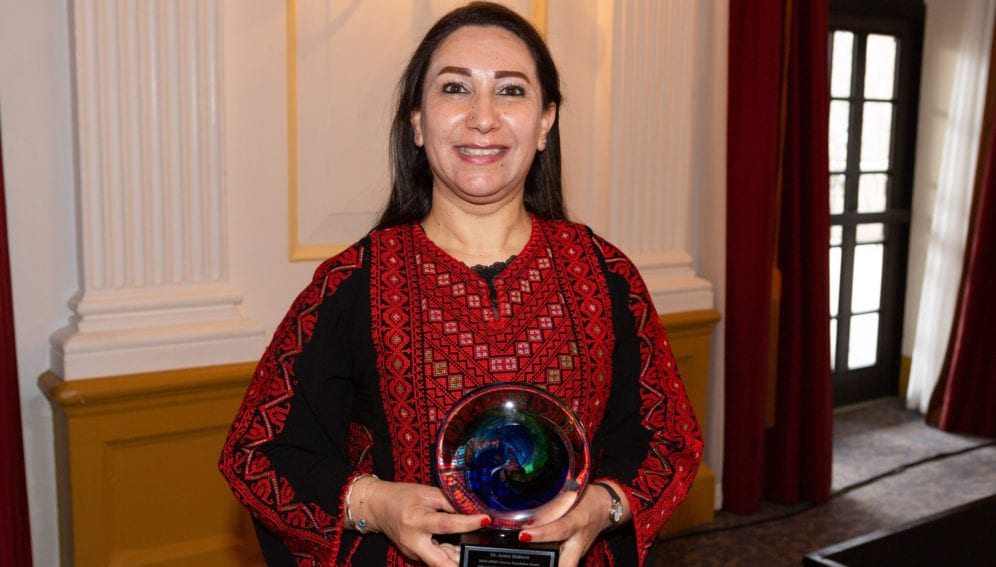17/04/19
Q&A: ‘Universities would rather highlight work of men’

Send to a friend
The details you provide on this page will not be used to send unsolicited email, and will not be sold to a 3rd party. See privacy policy.
Amira Shaheen is an assistant professor of epidemiology in the faculty of medicine and health sciences at An-Najah National University in the West Bank, where she focuses on population health and medical advances, especially for women and children.
Shaheen received her PhD in 2009, in epidemiology and population health from the London School of Hygiene and Tropical Medicine, on “The epidemiology of injuries in school-aged children in the Palestinian Territories”.
Earlier this year, she received the OWSD – Elsevier Foundation Award for Early-Career Women Scientists, 2019, in recognition of her research work and efforts to empower Palestinian women through science and research.
“There are many women who come up with great achievements in research-related fields, but universities would rather highlight the work of men. .”
Amira Shaheen, An-Najah National University in the West Bank
In an interview with SciDev.net she talks about the status of female researchers in the Arab region and the challenges they face.
How do you see the status of Arab female researchers?
In my experience, women do not get the same exposure and media coverage as men.
There are many women who come up with great achievements in research-related fields, but universities would rather highlight the work of men.
What do you see as the main challenges facing Arab women in research?
I would say patriarchy. Despite educational advancements in the region, communities still perceive women as inferior to men, both in social and academic life.
Most leadership posts in academia are reserved for men, with a total absence of women in the majority of specialist research committees.
The other hurdle is that women in research are still perceived as having other responsibilities such as household chores. Unfortunately, women should do all of it without any assistance or understanding of their profession as academics.
What issues do Palestinian women in particular face?
We share common problems with some Arab countries: funding issues, as well as universities focusing too much on education rather than research, so researchers don’t receive the support they need.
Universities pay salaries in return for teaching, so for researchers to devote themselves to research they must secure necessary funds as they won’t teach for a while; this is a significant obstacle.
“Sometimes obstacles are intentionally created to block women from advancing and succeeding in their field of research.”
Amira Shaheen, An-Najah National University in the West Bank
Living in the Palestinian territories adds to those issues: the problem of moving around and transfer between cities. I live in Nablus, and my research work involves visiting the Ministry of Health in Ramallah, which should take around 40 minutes but can take up to four hours, due to Israeli barricades.
In addition, I work with marginalised communities, which requires me to move through Israeli settlements, and that no doubt poses risks on my life and that of my colleagues.
Do men have a better chance of getting their research funded?
The majority of funds come from outside the Arab region, so there is equal chance. However, a female researcher must go through her manager – probably a man – who would complete the process and thus shares part of the recognition, even if the idea was all hers.
Sometimes obstacles are intentionally created to block women from advancing and succeeding in their field of research. This no doubt impacts the researcher’s psyche and makes them question whether they really want to pursue this profession.
The good news though, is that whenever there is a good administration in place, it definitely supports and encourages women to move forward.
What is your advice to young women scientists?
I always see value in conducting research that touches on people’s needs, so helping address issues and challenges in the community. I also recommend provoking change to prevalent culture and widely spread misconceptions.
For example, we need to change how communities perceive psychological disorders, to spread awareness that these disorders are just like any other medical problems and intervention is essential.
I would also like to tell them to be persistent. It is not easy to be a scientist in our context, but they should stay determined and keep working to achieve their goals. They should always keep in mind that their success is a light that keeps other women going.
This piece was produced by SciDev.Net’s Middle East & North Africa desk and edited for brevity and clarity.













